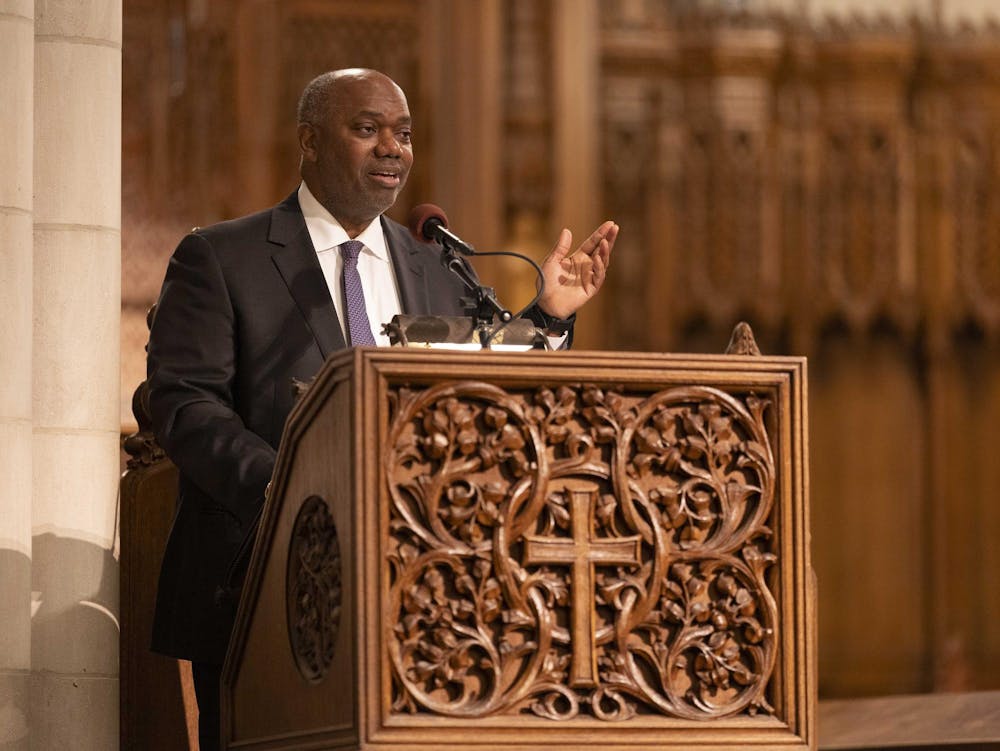Community members gathered in the Duke Chapel Sunday afternoon for the annual commemoration of Rev. Dr. Martin Luther King Jr., which featured a keynote address from Jerry Blackwell, U.S. District Judge for Minnesota.
Blackwell is most well known for his role as a special prosecutor in the trial of Derek Chauvin, the white police officer responsible for murdering George Floyd almost five years ago by kneeling on his neck — an event that spurred a surge of Black Lives Matter protests across the nation in summer 2020. The following year, Chauvin pleaded guilty to violating Floyd’s constitutional right to be free from excessive force by a police officer, and he was sentenced to 20 years in prison several months later.
The theme of the event, which took place the day before the national holiday, was “Hope Powered by Community: Protecting King’s Dream through Determination and Unity.” In his opening remarks, President Vincent Price underscored Duke’s progress in achieving inclusivity and underscored the University’s commitment to continuing that work.
“We can acknowledge the fact that through the courageous and dedicated efforts of many people who came before us, we have made progress in combating racism and bias,” Price said. “… However, we should also accept the truth that there is still more work to be done.”

Blackwell began his speech with his first quote from King: “The ultimate measure of a man is not where he stands in the moments of comfort and convenience, but where he stands at times of challenge and controversy.” He said he drew inspiration from King’s message of nonviolence as a “powerful tool of justice” when he became involved in the Chauvin trial.
Blackwell implored his audience to engage in public life and not be dissuaded by political differences.
“The people — each and every one of you — are the engine of America. Our participation in public life [and] our concern for the general welfare are the fuel for that engine,” he said. “… America, more than ever, needs your participation.”
He made an analogy for the students in the crowd.
“America’s take-home exam is to solve the problem of disunity, bridging our differences as Martin Luther King Jr. lived to do,” Blackwell said.
He pointed to the nation’s Latin motto, which is written on its Great Seal and engraved on several U.S. coins: E Pluribus Unum, meaning “out of many, one.”
“[The motto] reflected the idea from the very beginning of America that despite the diversity of states, diversity of religions, diversity of languages [and] diversity of cultures among early Americans, the colonies were committed to forming a single nation out of its diversity,” Blackwell said. “If the idea of strength and unity through our diversity is wrong, and if you think it a lie, then would that not make … the founders of this nation who were central in coming up with this idea … wrong?”
He stressed that he was not “talking politics” but instead “talking history.” He lauded the values espoused by King, which he described as “the rich soil that grew the United States of America” and “the foundations for the united states of the world.”
Blackwell acknowledged the feelings of fear and anxiety that many associate with today’s politics. He referenced a parable called “Three Angels in One Cave” to guide his audience through confronting that “inner sense of despair.”
The three angels, which had only known light, had to be “educated in confronting and overcoming something called ‘the darkness’” before they could spread their divine message. They entered the cave of darkness, where they encountered “fear, anxiety [and] despair” for the first time.
The angels decided that the experience was meant to be “a test of [their] fearlessness and faith,” and they resolved to defeat the darkness. But when they resorted to violence, they only injured themselves. What saved them in the end was shining their own light.
The ultimate message was that violence, hatred and inaction would not solve social and political problems today. Instead, “right activity and right attitude is what dispels the darkness.”
“Light your candle in the cave of darkness. Light your candle and carry Dr. King’s dream forward,” Blackwell said.

Durham Mayor Leonardo Williams made a short speech in honor of King, who he noted was a member of his fraternity, Alpha Phi Alpha Fraternity, Inc. He also acknowledged the recent death of E. Lavonia Allison, a “powerhouse” local civil rights leader who WIlliams said extended her hospitality — and her couch — to King when he visited Durham.
Get The Chronicle straight to your inbox
Sign up for our weekly newsletter. Cancel at any time.
Additional speeches were made by Elana Friedman, campus rabbi and Jewish chaplain; Dean of Duke University Chapel Luke Powery; Rhonda Brandon, senior vice president and chief human resources officer for Duke University Health System; Black Student Alliance President Joe Asamoah-Boadu Jr., a junior; Kerry Haynie, professor of political science and African and African American studies; and Joshua Salaam, chaplain and director of the Center for Muslim Life.
The event also featured musical performances by the John Brown Quintet and the United in Praise Gospel Choir.

